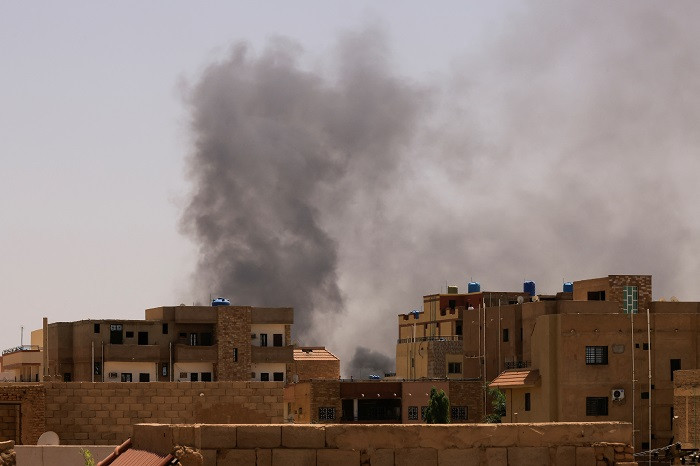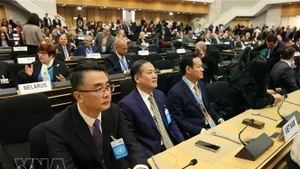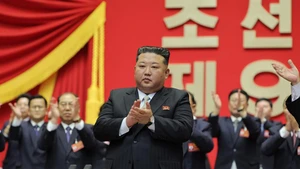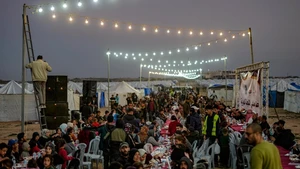Sudan's warring army and Rapid Support Forces (RSF) paramilitary group accused each other of attacking a convoy of French nationals, both saying one French person was wounded. France's Foreign Ministry, which had earlier said it was evacuating diplomatic staff and citizens, did not comment on the reports.
The army also accused the RSF of attacking and looting a Qatari convoy heading to Port Sudan. Doha released no immediate statement on any incident.
Egypt said a member of its mission in Sudan had been wounded by a gunshot, without giving details.
President Joe Biden said the US was temporarily suspending operations at its embassy in Khartoum but remained committed to the Sudanese people, reiterating calls for a ceasefire that have so far gone largely unheeded.
"The belligerent parties must implement an immediate and unconditional ceasefire, allow unhindered humanitarian access, and respect the will of the people of Sudan," Biden said in a statement.
Live TV feeds showed thick smoke still hanging over the capital, Khartoum, and its sister cities of Bahri and Ombdurman, as gunfire continued to ring out in some areas, a Reuters reporter said.
The fighting erupted in Khartoum and other parts of the country on April 15, four years after long-ruling autocrat Omar al-Bashir was toppled during a popular uprising, and has killed more than 400 people.
It pits Sudan's army against the RSF, who jointly staged a coup in 2021 but fell out during negotiations over a plan to form a civilian government and integrate the RSF into the armed forces.
The army under Abdel Fattah al-Burhan and the RSF, headed by Mohamed Hamdan Dagalo, known as Hemedti, have failed to observe ceasefires agreed almost daily, including a three-day truce for the Muslim holiday of Eid al-Fitr, which began on Friday.
Intense fighting has continued around the army's headquarters in central Khartoum and the airport, which has been closed by the clashes, and over the past two days in Bahri, where the army has used troops on the ground as well as air strikes to try to push back the RSF.
The RSF said on Sunday that its forces were targeted by air strikes in Bahri's Kafouri district and that dozens were "killed and injured".
"We strongly condemn this treacherous behaviour, which is inconsistent with the declared commitment to the 72-hour truce," the RSF said in a statement.
CHINOOKS
Sudan's sudden collapse into warfare has dashed plans to restore civilian rule, brought an already impoverished country to the brink of humanitarian disaster and threatened a wider conflict that could draw in outside powers.
Any let-up in fighting could accelerate a desperate rush to flee by many Khartoum residents, after days trapped in homes or districts under bombardment and with fighters roaming the streets.
Diplomats and foreign nationals have also struggled to find a way out.
US officials said special forces using aircraft including MH-47 Chinook helicopters swept into Sudan's battle-stricken capital on Saturday from a US base in Djibouti, spending just one hour on the ground to bring out fewer than 100 people.
"We did not take any small-arms fire on the way in and were able to get in and out without issue," said Lieutenant General Douglas Sims, the director of operations at the military's Joint Staff.
Chris Maier, an assistant secretary of defense, said the US military might use drone or satellite imagery to detect threats to Americans travelling on overland routes out of Sudan, or position naval assets at the Port of Sudan to aid Americans arriving there.
Under Secretary of State for Management John Bass said some Americans and other nationals had successfully travelled by land from Khartoum to Port Sudan on the Red Sea, which he said appeared to be a challenging journey given the lack of fuel, food and predictably available water.
Saudi Arabia has already evacuated Gulf citizens from Port Sudan on the Red Sea, 650 km (400 miles) from Khartoum. Jordan will use the same route for its nationals.
Egypt, which has more than 10,000 citizens in Sudan, urged its nationals outside Khartoum to head to its consulate in Port Sudan, and to a consular office in Wadi Halfa on the border with Egypt, in preparation for their evacuation. It encouraged those in Khartoum to shelter in place and wait for the situation to improve.
Beyond Khartoum, reports of the worst violence have come from Darfur, a western region bordering Chad that suffered a conflict that escalated from 2003 leaving 300,000 people dead and 2.7 million displaced.
















